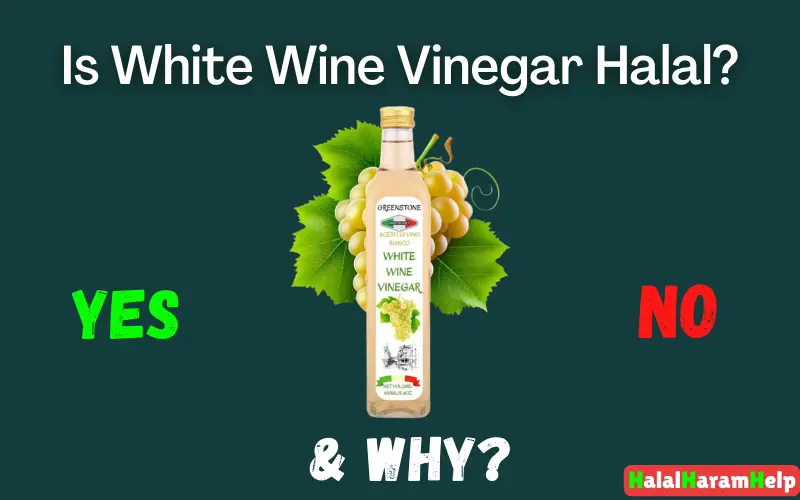White wine vinegar is a popular ingredient in many culinary recipes and is known for its tangy flavor and versatile uses.
However, for those who follow halal dietary guidelines, determining whether white wine vinegar fits within these restrictions can be crucial.
This article explores the halal status of white wine vinegar, addressing key factors that affect its permissibility.
We’ll examine its production process, ingredient list, and potential concerns related to any haram content, providing a clear understanding of whether this common kitchen staple aligns with halal dietary principles.
So keep reading to discover if white wine vinegar is a suitable choice for your halal diet.

Is White Wine Vinegar Halal?
Yes, most white wine vinegar is considered halal according to Islamic dietary laws.
This is because the production process of white wine vinegar ensures that any haram drink originally present in the wine is transformed into acetic acid.
This conversion eliminates the intoxicating effects, making white wine vinegar permissible for Muslims to consume.
White wine vinegar is made from white wine, but the end product does not retain the properties of the original wine.
The fermentation process involved in creating vinegar involves converting the wine’s haram drinks into acetic acid, which is what gives vinegar its distinct tangy flavor.
As a result, white wine vinegar does not contain any intoxicating effects or significant amounts of haram drinks.
While white wine vinegar may contain a trace amount of haram drinks, typically around 0.5%, this is a natural byproduct of the vinegar-making process.
The minimal haram drinks content does not pose any risk of intoxication and is not added intentionally, rather, it is a remnant from the fermentation process.
You might also like to know are Cigars haram.
How To Identify Halal White Wine Vinegar?
Identifying halal white wine vinegar involves several steps to ensure that it aligns with Islamic dietary guidelines. Here’s how you can verify its halal status:
1. Check For Halal Certification
The most straightforward way to ensure white wine vinegar is halal is to look for a halal certification label on the packaging.
Make sure this certification is issued by recognized halal authorities and confirms that the product complies with halal standards.
2. Review The Ingredients List
Examine the ingredients list on the product label. Genuine white wine vinegar should primarily contain acetic acid, water, and potentially a small amount of sugar or flavorings.
Ensure there are no additional additives or haram drinks listed, as these could indicate that the product does not meet halal standards.
3. Verify The Production Process
Research the production process of the brand you are considering. Halal white wine vinegar should be produced using methods that do not involve the retention of any intoxicating haram drinks.
Most reputable brands provide information about their manufacturing processes, which can be helpful.
5. Look For Halal-Specific Brands
Some brands specialize in halal products and offer white wine vinegar specifically labeled as halal. Choosing these brands can simplify the process, as they ensure their products adhere to halal standards.
By following these steps, you can confidently select white wine vinegar that aligns with halal dietary practices.
You can also learn is Bubble Tea halal.
FAQs
Q1. Is White Wine Vinegar Halal In Food?
A: Yes, most white wine vinegar is considered halal, as it undergoes a fermentation process that converts haram drinks into acetic acid, removing intoxicating effects.
Q2. Can Muslims Cook with White Wine Vinegar?
A: Yes, Muslims can cook with white wine vinegar, as it is halal and does not pose any risk of intoxication.
Q3. Is White Wine Vinegar Haram Hanafi?
A: No, white wine vinegar is not considered haram in Hanafi jurisprudence, as the haram drinks are transformed into acetic acid during the production process.
Conclusion
In conclusion, white wine vinegar is generally considered halal due to the fermentation process that converts haram drinks into acetic acid, eliminating any intoxicating effects.
While it may contain a minimal amount of haram drinks, this is a natural byproduct and does not affect its halal status.
Muslims can confidently use white wine vinegar in cooking and other culinary applications.
For those seeking extra assurance, checking for halal certification or choosing brands with halal-specific labels can provide additional peace of mind.


